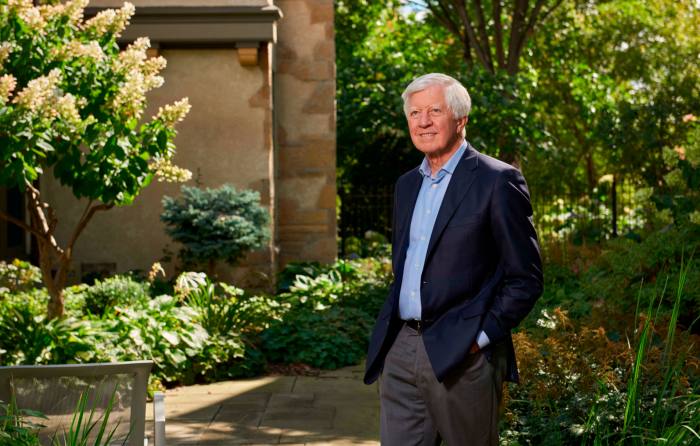
Bill George thinks that we can attribute everything from George Floyd’s murder to Vladimir Putin’s invasion of Ukraine to failed leadership. That is a provocative assertion from the former Medtronic chief executive turned Harvard Business School professor who has spent 20 years advising everyone from CEOs and generals to ambitious middle managers on how to lead.
George, who has sat on the boards of Goldman Sachs and ExxonMobil (among others), has just put out the latest in a series of books in which he has tried to guide those in authority to embrace “authentic leadership” to inspire and empower those they oversee.
In True North: Emerging Leader Edition, he and co-author Zach Clayton call on a new generation to find their “North Star” — their purpose — and to bring values and moral courage to the challenges they face.
It is the kind of thing that countless careerists browsing airport bookstores will lap up, and from which many more will recoil. There’s a market for quotes from Gandhi, Churchill and basketball coaches, or diagrams of suited figures climbing mountains while arrows point to words such as “crucibles”, but they are not everybody’s cup of tea.
What is notable about George, though, is how alert he is to the downsides of putting managers on mountaintops. After a recent conversation with him, what stuck with me is the need to give as much thought to how to build effective governance in organisations as we do to what makes an individual a leader worth following.
George agrees without hesitation, for example, that our obsession with leadership risks creating all-powerful bosses unchecked by meaningful governance.
The “adulation” of CEOs was already a problem back when Jack Welch was running General Electric, George notes. (David Gelles, a former FT colleague, has accused the once-lionised Welch in a recent book of “breaking capitalism” in his 20-year tenure.)
George worries about “cults” forming around business leaders, especially when it comes to founders such as Elon Musk or Mark Zuckerberg. “Leaders get caught up in money, fame and power,” he warns.

We are fascinated by corporate leadership. But does that obsession come at the expense of corporate governance, the less exciting business of ensuring that there are checks on any one individual’s power in a company, and different, challenging opinions around the boardroom table?
Governance is the G in ESG, but it is hard to argue that environmental, social and governance investing has killed off the cult of the CEO.
The age of ESG has certainly pushed boards to review their composition and monitor a wider array of risks. But it has not changed the balance of power between directors and the chief executive.
Particularly in the US, too many CEOs also chair the board, letting them pick the supposedly independent directors who will determine their pay and their longevity.
Board members, in turn, still spend too much time worrying about earnings, George argues. They should instead be asking more questions about company culture, what employee and customer surveys are showing, and whether the CEO is surrounded by “yes men”.
George was once threatened by a Theranos executive after he questioned Elizabeth Holmes’s leadership before the collapse of her blood-testing company. It reminded him of the dangers of leaders having too few “truth tellers” on their teams.
The prolific publisher is arguably a contributor to our leadership obsession but George is also a critic of corporate megalomania. His studies of other CEOs persuaded him that their performance deteriorated after the first decade, so he set himself a firm 10-year limit while at Medtronic, and he thinks many boards have been too weak in enforcing such limits.
We also need diverse boards with strong lead directors (including former chief executives) who pay attention to whether their CEO is listening to critics and developing the next tier of executives, he argues. Authentic leaders do matter to organisations — but so do structures that prevent them from believing the sycophants or staying too long.
It’s easier to sell a book on leadership than a book on governance: we all aspire to bring out our inner Ernest Shackleton but few of us want to read about corporate checks and balances. Similarly, most of us can name the CEOs of Tesla or Goldman; few of us know much about their independent directors.
It is too much to ask for George’s prescription to prevent the next police killing or revanchist war. But there are lessons in it for CEOs, boards and the people who advise them.
There is also a reminder that leaders who stay too long may be driven as much by insecurity as by megalomania. Asked about how difficult his peers find it to stop being the boss, George returns to the image of the executive mountaineer.
“I think for a lot of CEOs you’ve reached the mountain top, you’re at the pinnacle of your power and it looks like a long way down the other side. It looks like a cliff.”